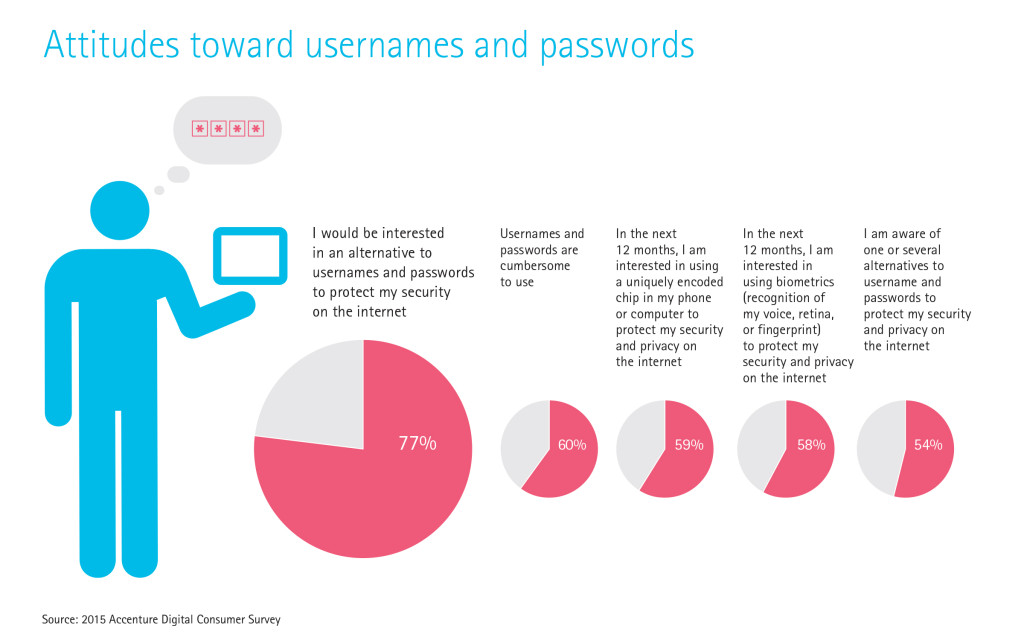 NEW YORK; July 13, 2015 – Signaling a potential change in a widespread practice, most consumers consider usernames and passwords cumbersome and are interested in using alternatives to them to protect their security on the Internet, according to new research from Accenture.
NEW YORK; July 13, 2015 – Signaling a potential change in a widespread practice, most consumers consider usernames and passwords cumbersome and are interested in using alternatives to them to protect their security on the Internet, according to new research from Accenture.
The research, based on a survey of 24,000 consumers across six continents, is summarized in a new report titled Digital Trust in the IoT Era. The research reveals that 60 percent of consumers find usernames and passwords cumbersome, and more than three-fourths (77 percent) are interested in using alternatives to protect their security on the Internet.
“The widespread practice of typing usernames and passwords to log on to the Internet might soon become obsolete,” said Robin Murdoch, managing director of Accenture’s Internet and Social business segment. “Consumers are increasingly frustrated with these traditional methods because they are becoming less reliable for protecting their personal data such as email addresses, mobile phone numbers and purchasing history.”
The research reveals that openness to alternatives is pervasive in countries in many different parts of the world, with consumers in China and India most likely to be open to alternatives, at 92 percent and 84 percent, respectively. More than three-quarters (78 percent) of consumers in each of Brazil, Mexico and Sweden, and 74 percent in the United States, are also willing to consider security methods other than usernames and passwords.
“As hackers use more-sophisticated and less-obvious methods, passwords are no longer seen as the definitive answers to the security question,” Murdoch said. “Traditional one-step passwords are now being matched with alternative methods using biometric technologies such as fingerprint recognition and two-step device verification. Within the next few years we are likely to see many more consumers embracing these and other alternative methods.”
The survey also found that less than half (46 percent) of consumers globally are confident in the security of their personal data. Consumers in emerging countries were slightly more confident in the security of their personal data than were those in emerging countries, at 50 percent and 42 percent, respectively.
“Digital trust concerns are not limited to one type of country or part of the world,” Murdoch said. “In developed and emerging countries, consumer wariness about data privacy and digital trust is intensifying as the exploding Internet of Things market generates unprecedented amounts of consumer data on more devices. Companies that build the most trust with consumers will be able to access more consumer data, use analytics to unlock more value from that data, and offer more revenue-generating services and applications leveraging Internet of Things opportunities.”
Methodology
The 2015 Accenture Digital Consumer Survey polled 24,000 consumers across 24 countries about their usage, attitudes and expectations related to digital device ownership, content consumption, broadband constraints, digital trust and the Internet of Things. The survey was conducted online in October and November 2014. The 24 countries represented were Australia, Brazil, Canada, China, the Czech Republic, France, Germany, India, Indonesia, Italy, Japan, Mexico, the Netherlands, Poland, Russia, Saudi Arabia, South Africa, South Korea, Spain, Sweden, Turkey, United Arab Emirates, the United Kingdom and the United States; the sample size in each country was proportional to the online population.
About Accenture
Accenture is a global management consulting, technology services and outsourcing company, with more than 336,000 people serving clients in more than 120 countries. Combining unparalleled experience, comprehensive capabilities across all industries and business functions, and extensive research on the world’s most successful companies, Accenture collaborates with clients to help them become high-performance businesses and governments. The company generated net revenues of US$30.0 billion for the fiscal year ended Aug. 31, 2014. Its home page is www.accenture.com.

